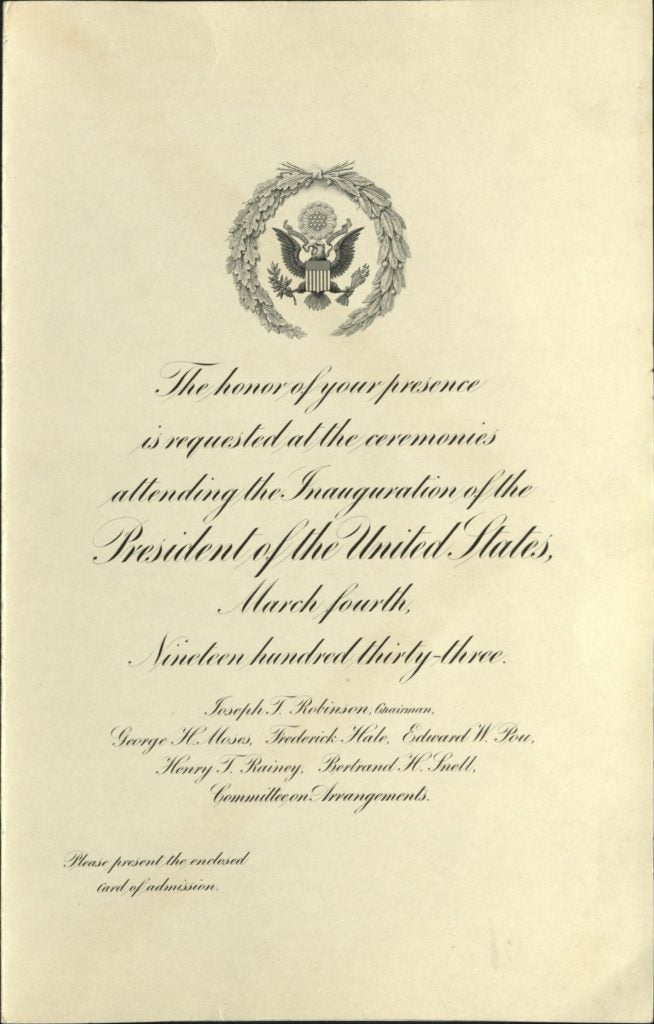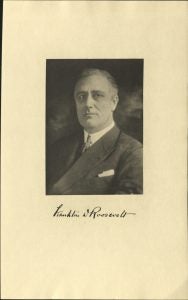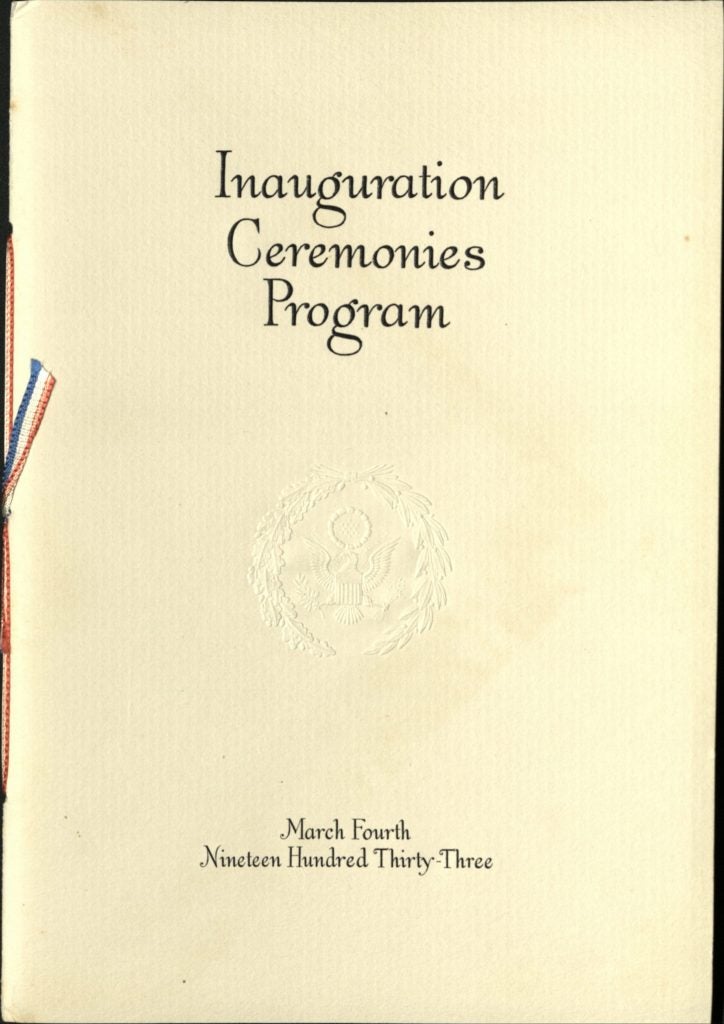Invitations to Franklin Delano Roosevelt’s First Presidential Inauguration Events, 1933
Invitations to Franklin Delano Roosevelt’s First Presidential Inauguration Events, 1933
STAFF PERSON: Patrick Cash
COLLECTION: Mary F. Howard Papers (#391)
The inauguration of the President of the United States every four years marks a truly significant moment in the history of our great democracy. Whether it is the American people putting their continued faith in the sitting President for four more years or the peaceful transfer of power to a new administration, this continued peaceful transition has remained a hallmark of our nation since the beginning. Throughout the years, the inauguration of the President of the United States has shifted from the constitutionally required taking the oath of office and inaugural address of the newly sworn in Commander in Chief to a day-long celebration of the American democracy that includes parades, gathering of political leaders and officials, formal social events, and balls.

“Invitation to the 1933 Inauguration of the President of the United States.” Mary F. Howard Papers (#391), East Carolina Manuscript Collection, J. Y. Joyner Library, East Carolina University, Greenville, North Carolina, USA.
In addition to the American public being invited to witness this important ceremonial occasion, other elected officials, high ranking military officials, political supporters, and other important dignitaries and individuals are invited to join the President and their families as guests of honor for the inauguration.
On March 4, 1933, Franklin D. Roosevelt was sworn in as the 32nd President of the United States. Roosevelt defeated incumbent Herbert Hoover during a time in which the nation was dealing with the effects of the Great Depression. In East Carolina University’s Mary F. Howard Papers there is an official invitation to President Roosevelt’s 1933 inauguration as well as the official Inauguration Ceremonies Program and the program for the Official Inaugural Concert that took place that evening in the Washington Auditorium. This collection also includes signed portraits of President Roosevelt and Vice President John N. Garner.
The 1933 inauguration of the President of the United States is particularly unique due to it being the last that took place on March 4th. Prior to the ratification of the 20th Amendment in 1933, the U.S. Constitution stated that the terms for the newly elected President as well as members of Congress would begin on March 4. The 20th Amendment, which was ratified on January 23, 1933, moved the beginning of the newly elected Presidents term from March 4th to January 20th, thus decreasing the amount of time that an administration might be considered a “lame-duck” a term used for outgoing administrations in their final months of office.

Franklin D. Roosevelt. Mary F. Howard Papers (#391), East Carolina Manuscript Collection, J. Y. Joyner Library, East Carolina University, Greenville, North Carolina, USA.
Mary Ferebee Howard was born June 22, 1913 in Tarboro, North Carolina. Howard joined the American Red Cross in 1942 and was assigned to the South Pacific from 1943 to 1945, serving in Guadalcanal, one of the islands that make up the Solomon Islands, New Zealand, and New Caledonia. During her time with the American Red Cross, Howard helped to open service clubs and planned social events for the military units stationed in the South Pacific. She and her colleague also worked to make life easier for the wounded and sick servicemen in the base hospitals. Howard’s memoirs talk about meeting individuals such as military leaders, celebrities, entertainers, and political officials and leaders as well as her encounters with fellow Red Cross volunteers. She recounts daily life in great and colorful detail and speaks of such things as the geography, endemic diseases, entertainments, living and working conditions, and treatment of Japanese prisoners.
Following her service in the American Red Cross, Howard returned to eastern North Carolina where she enrolled in East Carolina. She would go on to receive her Bachelor of Science and Masters of Arts degrees and would embark on a lifelong career as a public school teacher in Edgecombe County, North Carolina. Her life remained full of adventure and world travel, and she also devoted a significant portion of her time, energy, and resources to education. Her impact is felt today through a number of scholarships created in her name for schools and institutions across eastern North Carolina, including one at East Carolina University.

“Inauguration Ceremonies Program.” Mary F. Howard Papers (#391), East Carolina Manuscript Collection, J. Y. Joyner Library, East Carolina University, Greenville, North Carolina, USA.
The Mary Ferebee Howard Papers are one of many collections in the East Carolina Manuscripts Collection that includes materials related to presidential inaugurations. Other collections include the Carroll H. Leggett Collection and the Jack Holland Spain Papers.